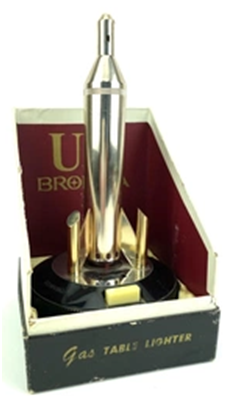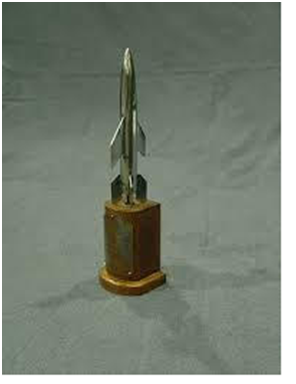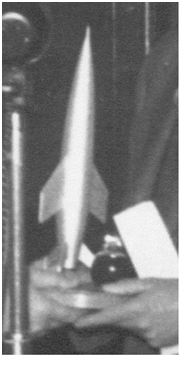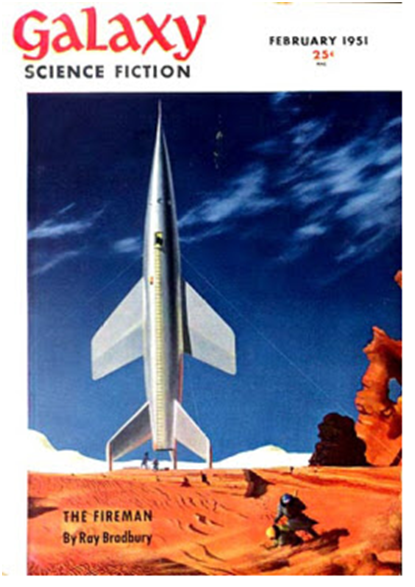By Dave Doering: While reviewing old fanzines of our early convention era, I note some curious parallels between the launch of the British “International Fantasy Award” (IFA) and the “Annual Science Fiction Achievement Award” [Hugo]. The big question is: “Who first came up with the idea?”
Origin Accounts
The IFA Origin: “The birth of the International Fantasy Award combusted spontaneously, as it were, during a conversation among four habituees [sic] of the London Circle at the White Horse Tavern one Thursday evening in April 1951.”
Dave Doering: With the event (titled Festivention) held on May 11-13th, and the statement that the awards were “conceived only two weeks prior to the convention”, this would likely have been Thursday, April 26, 1951.
“Highlight of this largest-ever British gathering was a surprise award promulgated by the London Circle for the Best fiction book and best technical book of 1950. The panel of critics chose George R. Stewart’s EARTH ABIDES (Random House) for fiction, and WIlly Ley & Chesley Bonestell’s CONQUEST OF SPACE (Viking Press) for the technical award. Forrest Ackerman accepted the two awards on behalf of his countrymen.”
The awards, conceived only two weeks prior to the convention, went on the drawing board immediately and a twelve-inch spaceship taken from the Bonestell design on the February 1951 GALAXY cover has been approved; it will be mounted on an oak base complete with ornate lighter.”
Dave Doering: This would have been a cigarette lighter, not a sailboat. Lighters were not uncommon add-ons in the 1950s awards. For example, here is one such trophy:

“Actual awards will be fashioned of heavy chrome for the fiction class, and bronze for the technical. Owing to the shortage of time, exact replicas were used in place of the models–not expected to be ready for some weeks. It is intended that these awards will be made annually, and planned to embrace other fields of science-fiction including the films.”
Dave Doering: Warp ahead from April 1951 to sometime in the summer of 1953:
The Hugo Origin: “The idea for the Awards was the brainchild of one of our club members, Hal Lynch. He came running over to my house one night, and said, “Hey, Bob, I’ve got a great idea! Why don’t we give awards for things like Best Novel and Best Magazine — sort of like the Oscars.”
And I said, “Gee, that’s great! We could call them the ‘Hugos’.”
Making the awards:
IFA: “For the event, it was only possible in the time available to have ready a facsimile of the actual Award trophies.”
Hugo: “Milt found out that the person who had originally been responsible for making the Awards had never even gotten started. So Jack stepped in and had to spend the entire convention in his machine shop.”
Appearance:


Design Origin
Hugo: ” Milt Rothman suggested we use a rocket design based on a Chesley Bonestell cover for a Willy Ley book”
Dave Doering: Most likely the 1949 edition of The Conquest of Space by Willy Ley:

IFA: “The design was taken from the Bonestell cover on the March [sic] 1951 Galaxy” [Note that the cover is actually from the February 1951 Galaxy. Perhaps the writer is referring to the date when the issue appeared in Britain.]

Dave Doering: Wow, a remarkable coincidence! So, yes, the same Father of the Rocket was chosen on both sides of the Pond for a major award. Here’s another one: the 1951 Non-Fiction IFA went to that very book that inspired the IFA/Hugo design– The Conquest of Space.
The Question Remains…
Did the IFA spark the launch of the Hugo award?
There certainly may be a question, however small, about whether the British award made in 1951 would have been of notice two years later to Hal Lynch in Philly in 1953.
On the other hand, how much more likely is it that fen in 1951-53 would have discussed a significant award in their field? (Given too that there were two IFAs in 1951–Fiction and Non-Fiction Book.) If not the winners themselves, fen would certainly discuss what this new award would mean to fandom, wouldn’t they?
Point 1: The IFA history says: “Considerable publicity has been given the Awards on both sides of the Atlantic”
Dave Doering: [I looked for zines of that era that reflect this publicity. Just may need to dig deeper.]
Point 2: The IFA committee announced their judging panel for the 1952 awards which included:
“ANTHONY BOUCHER and J. FRANCIS McCOMAS (jointly), as editors of Magazine of Fantasy and Science-Fiction, both noted connoisseurs, critics and anthologists. EVERETT F. BLEILER – leading anthologist and bibliophile. GROFF CONKLIN – well-known anthologist and book reviewer. BASIL DAVENPORT – literary critic of the New York Times and Book-of- the-Month Club. AUGUST DERLETH – outstanding anthologist, author and book reviewer. JUDITH MERRIL – leading woman fantasy author and editor.”
F&SF/Anthony Boucher/August Derleth/Judith Merrill were all big deals in SF in 1951-52 and being on the IFA’s award panel would certainly have been newsworthy in that era.
Point 3: Forrest J Ackerman attended the Festivention in England and carried home an actual IFA to the US. Wouldn’t 4E have mentioned this award in a zine or two?
Point 4: Even if news didn’t travel far or fast in 1951, wouldn’t it seem likely that Philly fen (if anyone) would have heard/discussed this award? Given the seniority of Phil-fen in fandom rivaling that of New York?
Yes, these are compelling points to me on the spark for the Hugos. I think the conclusion has to be our British compatriots not only planted the seed of our country but also planted the seed of the fabled Hugo.
Notes for Future Worldcons
Here’s a couple of points mentioned about the IFA and the Hugo that are of interest for Worldcons even today:
Meeting the Financial Challenge
IFA: “it is to be hoped that sufficient financial support will be forthcoming to maintain the high standard already set, and to establish a sound foundation for the future.”
“A special Fantasy Fund Award [sic] has been opened whereby anyone may donate.”
Hugo: “But how were we going to do it? Money didn’t flow freely in those days. In the end we decided to make them ourselves.”
Dave Doering: Even with today’s membership numbers, the Hugo awards now cost ~$12,000 to produce, a tidy sum for the committee. Should we return to “make them ourselves”? Tougher now as we don’t have hood ornaments to reuse.
Another British Solution:
On how to fund the IFA: “The idea was, for our American friends, a dollar-a-throw competition which entailed listing in order of preference their own six choices, with prizes amounting to $25.00 offered to the three winners placing the books’ correct order of merit as revealed by the adjudicators’ final selection.”
Dave Doering: Hmmm… Budget-conscious Worldcon committees might consider this contest idea for funding. Seems more dependable than hoping for help in lean years from a fan revolt to generate a blossoming of memberships.
Selecting Winners
Here’s a final question posed for the IFA in 1951 that reads exactly as a current-day post on the Hugos:
“The main question that has been asked, and which is still the most important factor of all, is: who will be the judges of what are the best works of fiction and non-fiction of 1951 in the fantasy field? Who are the best-suited people to state categorically that a certain book was the best literary achievement in fantasy published last year, worthy of an Award that could conceivably influence the sales of that book, and certainly enhance the reputation of the author?”
Dave Doering: Dang! 74 years later and this question is still on the table–hotly debated online and infinitely at the WSFS Business Meeting.
